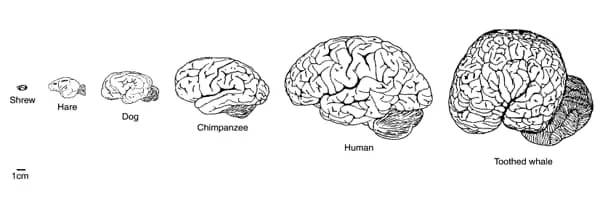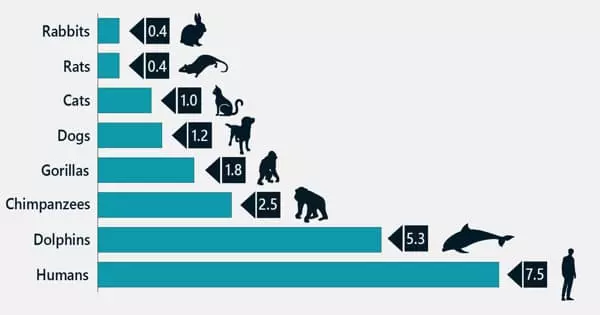Across the animal kingdom, brain size grows in proportion to body size. Despite this common scaling principle, brain size to body weight ratios vary from taxonomic group to taxonomic group. Despite the fact that brain tissue is metabolically expensive, primate brains have grown in size.
A team of researchers investigated the cognitive abilities of lemurs, which have small brains compared to other primates. Systematic tests using identical methods revealed that lemur cognitive abilities are nearly identical to those of monkeys and great apes. Instead, this study revealed that the relationship between brain size and cognitive abilities cannot be generalized, and it adds to our understanding of primate evolution.
Chimpanzees, gorillas, and orangutans are our closest relatives, and they, like us, have relatively large brains and are highly intelligent. But, do larger-brained animals really perform better in cognitive tests?
For the first time, a research team from the German Primate Center (DPZ) — Leibniz Institute for Primate Research in Göttingen investigated the cognitive abilities of lemurs, which have relatively small brains compared to other primates. Systematic tests using identical methods revealed that lemur cognitive abilities are nearly identical to those of monkeys and great apes. Instead, this research found that the relationship between brain size and cognitive abilities cannot be generalized, and it sheds light on the evolution of cognitive abilities in primates.
Our study shows that cognitive abilities cannot be generalized, but that species differ in domain-specific cognitive skills. As a result, there is no generalizable relationship between brain size and cognitive abilities.
Claudia Fichtel
Humans and non-human primates are among the most intelligent creatures on the planet. Because primates have relatively large brains in relation to their body size, their intelligence may be influenced by their brain size. Larger brains, for example, are thought to enable faster learning and better memory capacities. However, within primates, brain size can vary up to 200-fold. A team of researchers from the German Primate Center (DPZ) has now investigated whether lemurs’ cognitive abilities differ from those of other primates due to their relatively small brains.
Small children, great apes, baboons, and macaques have already been tested for their cognitive abilities in the physical and social domains using a comprehensive standardized test series of cognitive experiments known as the “Primate Cognition Test Battery” (PCTB). Cognitive skills in the physical domain include the understanding of spatial, numerical, and causal relationships between inanimate objects, whereas cognitive skills in the social domain include intentional actions, perceptions, and the understanding of other living beings’ knowledge. According to preliminary research, children have higher social intelligence than non-human primates. In the physical domain, however, the species hardly differed, despite the fact that their relative brain sizes vary greatly.

Researchers from the DPZ’s “Behavioral Ecology and Sociobiology Unit” have now tested three lemur species with the PCTB for the first time. Lemurs are the most primitive living primates, representing the evolutionary link between primates and other mammals, and thus serve as a living model of the origins of cognitive abilities in primates. The study looked at ring-tailed lemurs, black-and-white ruffed lemurs, and grey mouse lemurs, which differ not only in their social systems, diet, and brain size, but also in comparison to previously studied Old World monkeys and great apes.
The findings of the new study show that, despite having smaller brains, lemurs’ average cognitive performance in the PCTB tests was not significantly different from that of other primate species. This is also true for mouse lemurs, which have brains 200 times smaller than chimps and orangutans. Only primate species with larger brains performed better in tests examining spatial reasoning. However, no systematic differences in species performance were discovered in either the understanding of causal and numerical relationships or in social domain tests. The results of the PCTB experiments could not be explained by diet, social system, or brain size.
“Our study shows that cognitive abilities cannot be generalized, but that species differ in domain-specific cognitive skills,” says Claudia Fichtel, one of the study’s two first authors and a member of the German Research Foundation. “As a result, there is no generalizable relationship between brain size and cognitive abilities.”
The study is the first systematic and comparative examination of cognitive abilities in lemurs, and it sheds light on the evolution of cognitive abilities in primates. The research team emphasizes, however, that additional comparative studies in a variety of other species are required to answer the many questions about the relationship between brain size, diet, social life, and cognition.















